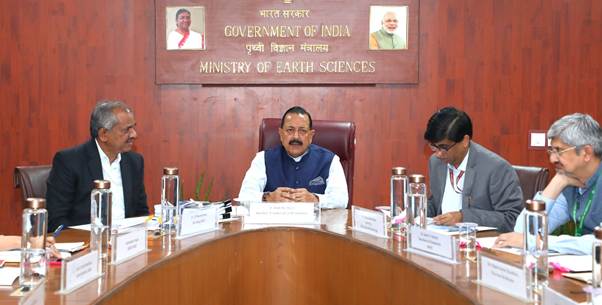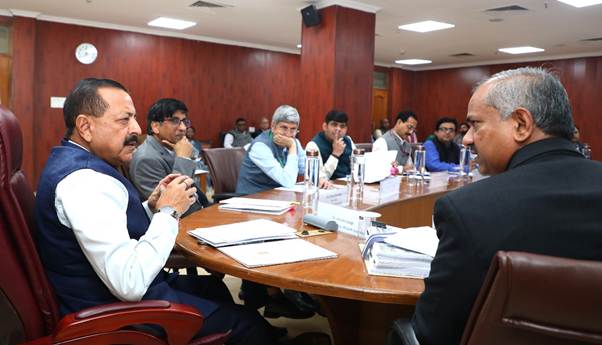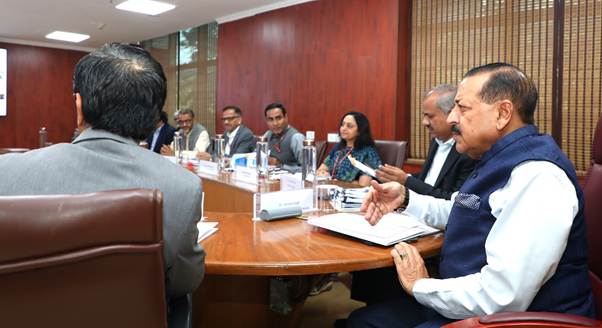Ministry of Earth Sciences
First General Body meeting of the Earth System Sciences Council (ESSC), chaired by Union Minister Dr. Jitendra Singh in his capacity as President of the Council
5 institutes of the Ministry of Earth Sciences brought under a single umbrella by merging five separate Societies into one
The days of working in silos are over, this exercise is in the spirit of 'Whole of the government' approach, often reiterated by PM Narendra Modi, says the Minister
Dr. Jitendra Singh Calls for Unified Governance and Stronger Public Outreach
Move Toward Single Annual Report Under Study as ESSC Reviews Streamlining of Parliamentary Submissions
प्रविष्टि तिथि:
17 NOV 2025 6:18PM by PIB Delhi
5 institutes of the Ministry of Earth Sciences have been formally brought under a single umbrella by merging five separate Societies into one single called "Earth System Sciences Council" (ESSC). Expressing satisfaction over this development, Union Minister of Earth Sciences Dr. Jitendra Singh said, the days of working in silos are over, this exercise is in the spirit of 'Whole of the government' approach, often reiterated by PM Narendra Modi.
The first General Body meeting of the Earth System Sciences Council (ESSC), chaired by Union Minister Dr. Jitendra Singh in his capacity as President of the Council, focused on streamlining governance across India’s earth sciences institutions and strengthening their public identity. During the meeting, senior officials discussed the transition of five separate institutes 5 autonomous bodies into a single coordinated framework under ESSC, a move aimed at improving efficiency, reducing administrative overlap and enhancing the visibility of earth system science initiatives.
Officials briefed the Minister on the ongoing integration process, noting that five autonomous institutions—earlier functioning with separate governing bodies, finance committees and advisory groups—will now operate through a unified governance mechanism. The consolidation, already approved by the Cabinet and formalised with ESSC’s registration in December 2023, is intended to support the government’s broader approach of “minimum government, maximum governance.” Each institute, however, will retain its identity and continue to function within its established mandate.
Dr. Jitendra Singh emphasised the need for consistency and clarity in the new structure, particularly in how committees, designations and organisational charts are presented. He advised that official documents should prominently highlight ESSC to reinforce the Council’s identity and ensure uniformity across institutions. He also encouraged the use of functional designations rather than individual names when listing committee members, especially for positions that may change frequently.
A significant portion of the discussion focused on improving public communication. Dr. Jitendra Singh noted that many institutions possess unique strengths—whether in ocean science, cryosphere research or atmospheric systems—but their identities often do not reach the public effectively. Citing examples from other scientific bodies, he suggested theme-based outreach campaigns that highlight specific achievements and help individual institutes build a stronger national presence. He pointed out that clear thematic positioning could increase the relevance of scientific work and attract wider recognition.
Officials also raised issues related to parliamentary reporting. Although ESSC currently submits multiple reports for different institutes, members discussed the possibility of streamlining these into a single consolidated annual report, in line with the Council’s unified structure. The Minister advised that the proposal may be explored further in consultation with parliamentary authorities.
The meeting also reviewed annual reports for 2023–24 and discussed the need for concise, accessible summaries that draw attention to key achievements. Dr. Jitendra Singh stressed that directors’ reports should be focused and readable, allowing essential highlights to stand out clearly.
The session concluded with agreement to continue refining the integrated governance model and to hold further discussions during the next inter-institutional review meeting. As India advances major national missions—including the Deep Ocean Mission and the Blue Economy initiative—the ESSC’s streamlined functioning is expected to play a central role in coordinating scientific research essential for environmental monitoring, climate resilience and sustainable development.



******
NKR/AK
(रिलीज़ आईडी: 2190918)
आगंतुक पटल : 824